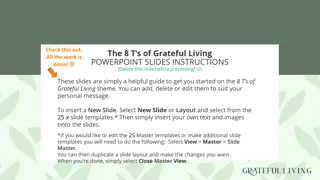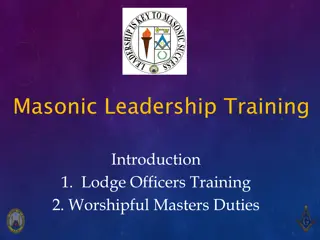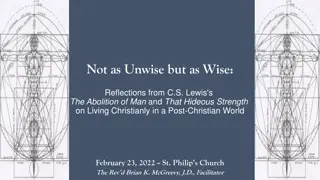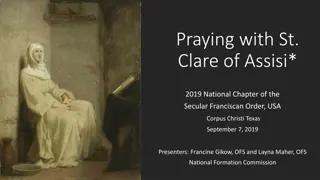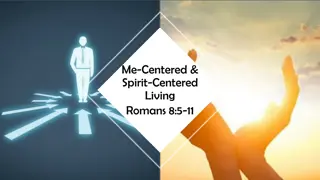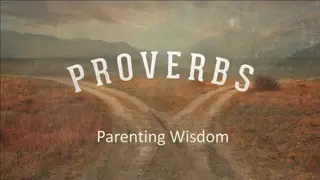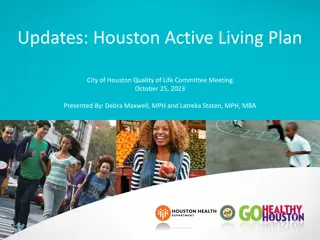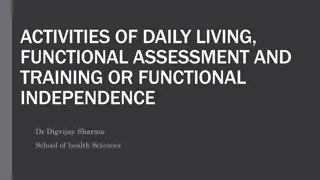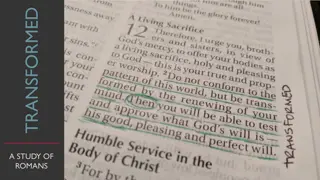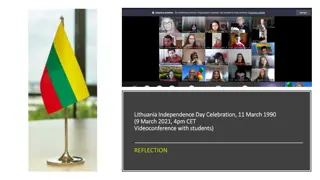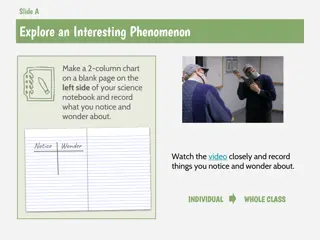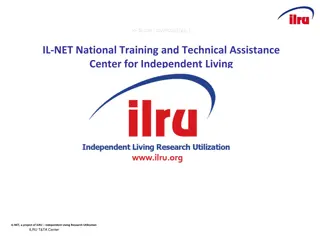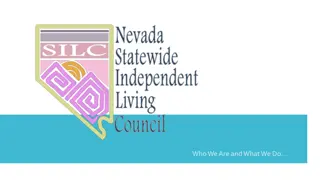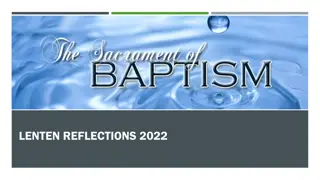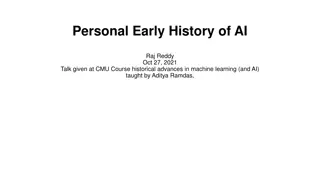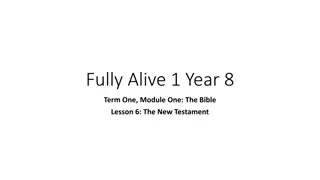Living a Grateful and Worshipful Life: Practices and Reflections
Embrace practices of celebration, gratitude, solitude, and worship in your daily life as a response to the prompting of the Holy Spirit. Explore methods like keeping a gratitude journal, celebrating communion, practicing the presence of God, and engaging in various worship practices. Draw inspiration from biblical role models and quotes to deepen your spiritual life.
Download Presentation

Please find below an Image/Link to download the presentation.
The content on the website is provided AS IS for your information and personal use only. It may not be sold, licensed, or shared on other websites without obtaining consent from the author. Download presentation by click this link. If you encounter any issues during the download, it is possible that the publisher has removed the file from their server.
E N D
Presentation Transcript
Celebration Gratitude (Worship Practice) (Worship Practice - Corporate - Engagement) To be sensitive to the Holy Spirit s prompting to live with a grateful heart, aware of God s work in my life and my abundant resources. To take joyful pleasure in God and God s people, Word, world and purposes. Psalm 136:1-2 1 Thess 5:16-18 Philippians 4:6 Psalm 37:4 Psalm 139:14 Philippians 4:4 Scriptures Scriptures Role Model(s) David (Psalms, e.g. 3, 16, 18, 20, 30, 59) The Sinful Woman (Luke 7:36-50) Paul & Silas (Acts 16:16-40) David (2 Samuel 6) Role Model(s) Feeling gratitude and not expressing it is like wrapping a present and not giving it. Any dance of celebration must weave both the sorrows and the blessings into a joyful step. Quote Quote ~ William Arthur Ward ~ Henri Nouwen Methods Methods Keep a gratitude journal where you give God thanks (especially for things you didn t deserve). End each day by thanking God for at least one thing. Write a letter or call someone who has blessed you recently. Thank God for a hardship in your life and ask Him to show you how He is using it to bless you. Avoid comparing your life to others. Give thanks for what you do have and for your limitations. Search for the place you most readily connect with God (e.g., in nature, in a quiet place, in worship ) and talk to God about the joy you experience there. Celebrate the events of the church calendar (i.e., Lent, Easter, Pentecost, Advent, Christmas, Epiphany, All Saints Day). Make a special effort to celebrate the people who bring you joy, and include them in the celebration. Holy Communion (Worship Practice) Solitude (Worship Practice - Outward - Abstinence) To refrain from being with other people in order to be alone with God. (Solitude is the foundation of several other disciplines.) To remember Christ s sacrifice when His body was broken and His blood was poured out for me. Mark 14:22- 24 1 Corinth 10:17 1 Corinth 11:26 Scriptures Genesis 32:24 Lamentations 3:28 Mark 1:35 Scriptures Role Model(s) Early Church (Acts 2:42-47) Paul (Acts 20:7) Role Model(s) Elijah (1 Kings 19:1-18) Jesus (Matthew 4:1-2; 14:13, 23; 26:36) If angels could be jealous of men, they would be so for one reason: Holy Communion. ~ St. Maximilian Kolbe Solitude is the one place where we can gain freedom from the forces of society that will otherwise relentlessly mold us. Quote Quote ~ John Ortberg Methods Methods Celebrate communion in family groups, dipping the bread into a common bowl of wine or juice. Use one loaf of bread and have each person tear off a piece. Drink from the same cup. Emphasize Old Testament symbolism from the Passover meal, e.g., the sacrificial lamb, blood on the doorpostand striped matzoh bread. Eat an actual meal together after breaking the bread and drinking the wine or juice. Find times to be by yourself and intentionally and expectantly listen to God s leading. Ask Him to speak to you when: You go on retreat. You are in nature. You are at lunch. You re in the bathroom. You take a shower. You are driving. You exercise. You are awake at night.
Practice the Presence of God (Contemplation Practice) Worship (Worship Practice) To develop a continual openness and awareness of Christ s presence living in me and working around me. To intentionally cherish God and value Him above all else in life. Exodus 33:14 Psalm 16:11 Hebrews 13:5 Matthew 4:10 John 4:23-24 Revelation 4:11 Scriptures Scriptures Elisha (2 Kings 6:15-17) Brother Lawrence (The Practice of the Presence of God) Role Model(s) Solomon (1 Kings 8) Anna (Luke 2:36-38) Role Model(s) If worship does nothing else for us, it helps us discover the things that are important. Real worship will transform your life. We may ignore, but we can nowhere evade, the presence of God. The world is crowded with Him. He walks everywhere incognito. Quote Quote ~ Warren Wiersbe ~ C.S. Lewis Methods Methods Visit a worship service with a different tradition or style than you are used to. Write a letter or song to God expressing your love and honor of Him. Meditate on the names of God. Sacrifice your time, talent and/or treasure to God. Try different postures (hands open/closed, bowing, standing, kneeling, laying, dancing) as you worship. See God in interruptions. Rather than being upset by them, ask God what He is doing through them. Set an alarm that goes off several times a day. When it alerts you, spend the next few moments in prayer, silence or Scripture reading. Dedicate tasks to the Lord. Talk to Him about the task before you begin and after you finish. Ask God to show you what He is doing around you. Meditation / Contemplation (Contemplation Practice Inward - Engagement) Examen / Reflection (Contemplation Practice - Engagement) To dwell on God s Word and works expecting the Spirit to provide fresh insight and application to my life. To notice how God is working around me and how I cooperate with or resist Him throughout the day. Psalm 19:14 Psalm 145:5 Acts 17:27 Psalm 26:2 Proverbs 5:21 Jeremiah 17:10 Scriptures Scriptures Role Model(s) The Blessed One (Psalm 1:1-2) David (Psalm 139 & others) David (Psalm 26) Ignatius of Loyola (The Spiritual Exercises of St. Ignatius) Role Model(s) By study we seek the truth in books or in some other source outside our own minds. In meditation we strive to absorb what we have already taken in. Life is lived forward, but it can only be understood backward. Quote Quote ~ S ren Kierkegaard ~ Thomas Merton Methods Methods At least once each day, ask yourself some or all of the following questions: How has God been present in my day? How did God speak to me today? In what ways did I resist God today? In what ways did I cooperate with God today? In what ways is God calling me to a new way of understanding things in my life? What needs healing in my life? 1. Put away anything that could distract you. 2. Find a comfortable place to sit, stand or kneel, or go for a walk. You should be alone during this time. 3. Choose a Scripture, an aspect of God or an aspect of God s creation on which you would like to focus. 4. Spend time thinking deeply about this topic, asking the Holy Spirit to guide you and give you wisdom. 5. Thank God for the new insights He gives you. 6. Journaling your thoughts can help you to focus.
Journaling Study (Contemplation Practice - Engagement) (Wisdom Practice - Inward - Engagement) To be alert to my life through writing and reflecting on God s presence and activity in, around and through me. To read, listen to and study the Scriptures and other supporting materials to gain deeper understanding. 2 Timothy 3:16 Colossians 3:16 Psalm 119:11 Scriptures Psalm 102:18 Habakkuk 2:2 Revelation 21:5 Scriptures Role Model(s) Bereans (Acts 17:11) Jesus (Luke 24:27) David (The Psalms) Nehemiah (The book of Nehemiah) Role Model(s) The Bible grows more beautiful as we grow in our understanding of it. I write, because I don t know what I think until I read what I say. Quote Quote ~ Johann Wolfgang von Goethe ~ Flannery O Connor Methods Methods Use tools like a concordance, Bible dictionary, harmony of the Gospels, sermons, and commentaries. Study with friends and discuss what you are learning. As you read, ask yourself the following questions: WHO Who are the major characters & the author? WHAT What are the main ideas? WHEN When was it written? When did it happen? WHERE Where did this happen? WHY Why did God include this in the Bible? HOW How did it happen? Try some of these different approaches: Use your journal as your daily examen. Record your prayers and answers to prayer. Create a photo journal, in which you post pictures and your thoughts about them. Add clippings from newspapers and magazines to help you journal about and pray for this world. Make a journal for a child, parent or friend, in which you record important events and prayers for them. Memorization (Wisdom Practice) Guidance / Spiritual Direction (Wisdom Practice Corporate - Engagement) To commit verses, passages and books of the Bible to memory so that their truths will transform me. To discern the voice and will of God with the help of the Holy Spirit, friends, pastors, coaches and mentors. Deut 11:18 Psalm 119:11 Jeremiah 15:16 Proverbs 4:1-9 John 16:12 Philippians 4:11 Scriptures Scriptures Role Model(s) Jesus (quotes from 180 OT passages) Paul (quotes from 183 OT passages) Role Model(s) Mary (Luke 10:38-39) Timothy (1 & 2 Timothy) A thorough knowledge of the Bible is worth more than a college education. God s purpose in guidance is not to get us to perform the right actions. His purpose is to help us become the right kind of people. Quote Quote ~ Theodore Roosevelt ~ John Ortberg Methods Methods Write a verse on a card or sticky note, and put it somewhere you will see it frequently. Read the verse out loud each day and several times a day. Create Scripture flashcards, and test yourself as you work through them. Get friends or family members to quiz you. Put a verse to a melody that you can sing. Get a memorization app (like Bible Memory Verses or Fighter Verses) for your phone. 1. Determine what goal you would like to achieve with guidance (e.g., learn how to improve in praying). 2. Pray that God will show you the right person or group, who can provide you with guidance. 3. Have courage to ask that person or group to meet with you for six months to provide spiritual direction. (A six-month commitment gives you both a natural time to end the relationship if needed.) 4. Agree on a regular meeting schedule, and stick to it. 5. Journal what you learn along the way.
Sabbath Retreat (Self-Care Practice) (Self-Care Practice - Abstinence) To remove myself from the daily battle so that I can be refreshed, retooled and renewed. To set apart one day a week for rest and to direct my thoughts and actions toward God. Psalm 23:2-3 Matthew 11:28 Mark 6:30-32 Exodus 20:8-10 Mark 2:27 Hebrews 4:1, 9-11 Scriptures Scriptures Role Model(s) Paul (Galatians 1:17-18) David (2 Samuel 22:17-20) God (Genesis 2:2-3) Paul (Acts 13:13, 42, 44; 16:13; 18:4) Role Model(s) Spiritual disciplines are a means to create that space in which something can happen that you hadn t planned on or counted on. Sabbath is not about worship. It is about work stoppage. It is about withdrawal from the anxiety system of Pharaoh, the refusal to let one s life be defined by production and consumption and the endless pursuit of private well-being. Quote Quote ~ Henri Nouwen ~ Walter Brueggemann Methods Methods Find a retreat center near you, and spend a day away with God. Take your Bible and a journal only. Spend a day in nature with your Bible and a journal. Bring back a memento (e.g., a photo or rock). Celebrate your birthday by making it a retreat. Spend time in a hermitage. Take time away for a fasting retreat before an important decision or change in your life. Set aside a 24-hour period of time each week in which you will rest in God and enjoy the company of others. (It doesn t have to be Sunday.) Plan restful activities like worship, family time, being outdoors, napping, or talking with friends or family. Discipline yourself not to do work for your job, home or church on this day. Simplicity Rest / Slowing (Self-Care Practice) (Self-Care Practice Outward - Abstinence) To uncomplicate and untangle my life so that I can focus on what really matters. To honor God by accepting my limitations and His sufficiency as I pay attention to my need for physical, mental, emotional and spiritual rest. Matthew 6:19-21 Matthew 6:33 Luke 12:15 Scriptures Psalm 46:10 Psalm 62:1 Psalm 127:2 Scriptures Role Model(s) John the Baptist (Matthew 3:4) Paul (Philippians 4:11-12) Role Model(s) God (Genesis 2:2-3) Nehemiah (Nehemiah 13:15-22) All great spirituality is about letting go. Quote If you can t take time to do nothing, you re a slave to doing. Doing nothing is a radical, revolutionary act. It frees you from slavery to the clock. ~ Richard Rohr Quote Methods Periodically review your life (and your storage areas!) to see if there are things, obligations, time- wasters, or clutter that you could eliminate. Have a Simplicity Yard Sale and sell anything that makes your life more complicated. Give away whatever doesn t sell. If someone admires something, give it to them. Intentionally limit your choices of TV channels, entertainment, breakfast foods, clothing, etc. Don t say yes for at least 24 hours when someone asks you to do something new. Pray about it first. ~ Peter Kreeft Methods Ensure you get at least 8 hours of sleep each night. Take time to chew slowly when you eat. Lay your utensils down several times, and focus on the conversation. Schedule buffer time between meetings. Schedule time every day to do something restful. Intentionally drive in the slow lane or choose the longest line to queue in. Practice patience.
Accountability / Submission (Submission Practice - Outward - Engagement) Mourning (Submission Practice - Engagement) To process feelings and expressions of deep grief or sorrow so that I can heal and let go. To give a regular and honest account of my choices, priorities and temptations to a godly and wise companion who points me to Christ. Ecclesiastes 3:4 Ecclesiastes 7:2-3 Matthew 5:4 Scriptures Galatians 6:1-2 Hebrews 3:13 James 5:16 Scriptures Role Model(s) Abraham (Genesis 23) Job (Job 3) David & Jonathan (1 Sam 18:1-4) Paul & Barnabas (Acts 11-13) Role Model(s) When the train goes through a tunnel and the world gets dark, do you jump out? Of course not. You sit still and trust the engineer to get you through. As iron sharpens iron, so one person sharpens another. Quote Quote ~ Proverbs 27:17 ~ Corrie Ten Boom Methods Methods 1. Ask God to show you a person you can ask to hold you accountable. 2. Pray for the courage to ask the person to be your accountability partner. Then talk to them. 3. Schedule regular times to meet together. 4. Commit to sharing your struggles honestly and transparently. 5. Pray for and encourage one another. 1. Decide what loss, issue, change or sin in your life requires a time of mourning. 2. Choose a time and a place where you can mourn undisturbed. 3. Allow yourself to be sad and to weep if necessary. (If you find it difficult to weep, try watching a sad movie, listening to sad music or reading a sad story.) 4. If you are mourning over your own sin, repent over your behaviors, and commit to change. Secrecy / Humility (Submission Practice - Abstinence) Rule for Life (Submission Practice) To avoid self-promotion and to serve God and others without letting anyone know. To create an intentional pattern and rhythm in my life that helps me love God more and become the best image of Jesus I can be. Matthew 6:1-6 John 3:30 Colossians 3:12 Scriptures Deut 30:11-20 Job 31:1 Matthew 7:12 Scriptures Role Model(s) Jesus (Mark 1:44; 9:9; Luke 8:56) Moses (Numbers 12:3) Role Model(s) Early Church (Acts 2:42) Saint Benedict (Rule of St. Benedict) Work for a cause, not for applause. Live life to express, not to impress. Don t strive to make your presence noticed, just make your absence felt. You are not creating a blueprint for being a spiritual superhero. The goal is to set out some spiritual priorities you can keep. You will be better off to start too small. In time you can revisit your rule and make changes. Quote ~ Anonymous Quote Methods Do something kind for someone anonymously (especially someone who has been unkind to you). Volunteer in a ministry without telling anyone other than your spouse or accountability partner. Avoid taking credit for your strengths, behaviors or accomplishments. If praised, give a simple thank you. Allow yourself to be misunderstood. In conversations, try to learn about others rather than talking about yourself. ~ Rev. Frank Logue Methods 1. Brainstorm commitments you want to make Spiritually, Relationally, Physically, Financially & Missionally. 2. Determine how often you want to do each one. 3. Create a visual reminder you can see each day.
Control of the Tongue / Truth Telling (Submission Practice) Confession (Submission Practice - Corporate - Engagement) To regularly confess my sins to the Lord and other trusted individuals or groups. To speak in a way that builds up rather than tears down and that does not exaggerate, minimize, deny, rationalize or manage the truth. Psalm 139:23-24 James 5:16 1 John 1:8-10 Scriptures Proverbs 12:19, 22 Matthew 15:11 James 3:1-12 Scriptures Role Model(s) David (Psalm 32 & 51) The Tax Collector (Luke 18:9-14) Nathanael (John 1:47) Barnabas (Acts 4:36) Role Model(s) To confess your sins to God is not to tell Him anything He doesn't already know. Until you confess them, however, they are the abyss between you. When you confess them, they become the bridge. Lying makes a problem part of the future; truth makes a problem part of the past. Quote Quote ~ Frederick Buechner ~ Rick Pitino Methods Methods Form or join an accountability group, small group or covenant group that regularly confesses to each other. Examine your life in light of the Ten Commandments. Make a life confession: divide your life into 7-year segments and list your sins during each one, then confess them aloud by yourself or to a trusted friend. Use Psalm 32 or 51 as a way to bring your own sins before God and ask for His forgiveness. When you have strong emotions, ask God to show you why and to surface any sin that might be related to them. When angry or upset, count to ten or take a time out before you speak. Ask a trusted friend to give you a secret signal when your words are tearing down rather than building up. Excuse yourself from conversations involving gossip. When you exaggerate or tell a lie, confess right away or give yourself a penalty, e.g., put money in a jar. At the end of each day, review how you used words, and confess any harmful or false speech to the Lord. Fasting Silence (Fasting Practice - Inward - Abstinence) (Fasting Practice - Abstinence) To give something up so that I can break its hold on me and prioritize God s will and His work. To stop speaking in a quiet place so that I can attend fully to God or another person. Isaiah 58 Matthew 4:4 Matthew 6:16-18 Scriptures Habakkuk 2:20 1 Kings 19:12 James 1:26 Scriptures Role Model(s) Nehemiah (Nehemiah 1:4) Esther (Esther 4:15-16) Role Model(s) David (Psalm 39:1-2) Jesus (Isaiah 53:7) If we are full of what the world offers, then perhaps a fast might express, or even increase, our soul's appetite for God. I have often repented of having spoken, but never of having remained silent. Quote Quote ~ Arsenius ~ John Piper Methods Methods Listen to your surroundings. First, focus on your breathing. Then, expand your focus little-by-little to take in the environment around you. When thoughts distract you from God, either write them down or give them to God for safekeeping. Practice silence in your car as you commute. Discipline yourself to not always fill the silence when talking with someone. Begin and end your quiet time with moments of silence. Get a doctor s opinion before you begin a dietary fast. Skip a single meal. As you improve your ability to fast, go for longer times without eating. Keep a time log of everything you spend time on in a day or week. What are you dependent on? For a time, give up something that you ve become dependent on, e.g., TV, internet, gossip, Facebook, news, texting, shopping, games, caffeine, sugar. Dedicate any time and money saved during a fast to God. Spend time in the Bible, in prayer and reflection.
Fellowship / Small Group (Community Practice - Engagement) Prayer Partnership (Community Practice) To commit with one or more believers to pray together during regular times of shared intercession. To enter into authentic, confidential, challenging, encouraging, refreshing and healing relationships with a committed group of fellow pilgrims. Colossians 4:3 1 Thess. 5:25 James 5:13-16 Scriptures Romans 12:10 Hebrews 3:13 Hebrews 10:25 Scriptures Role Model(s) The Early Church (Acts 1:13-14; 12:5, 12) Paul and Silas (Acts 16:25) Jesus (Matthew 4:18-22) The Early Church (Acts 2:42-47) Role Model(s) Nothing tends more to cement the hearts of Christians than praying together. Never do they love one another so well as when they witness the outpouring of each other's hearts in prayer. When Jesus started His ministry, the very first thing He did was form a small group. Quote Quote ~ Charles Finney ~ Rick Warren Methods Methods Pray that God will show you the right person or people with whom to form your prayer partnership. (Even children can make great prayer partners!) Determine what the focus of your prayer partnership will be, e.g., each other and your families, work, missions, healing, world events, world leaders, community, the lost, a particular event or a combination of areas. Agree on a regular meeting schedule and place. Experiment with different types of prayer: prayer walks, conversational, fixed-hour (even if you can t be physically in the same place), liturgical, praying Scripture, etc. Celebrate together God s answers to your prayers. 1. Pray that God will show you the right people with whom to form a group or an existing group to join. Your group can be as small as three people. 2. Determine what the focus of your group will be, e.g., accountability, fellowship, study, healing, outreach, service, missions, discipleship, book club, prayer or common interest (like cycling, computers, or food). 3. Agree on a regular meeting schedule and place. 4. Share life together. Chastity / Sexual Purity (Fasting Practice - Abstinence) Frugality (Fasting Practice - Abstinence) To practice sexual purity according to Biblical principles. To learn to live with less money and less of what money can buy so that you can give more for the work of God. Proverbs 6:20-35 1 1 Thess. 4:3-5 Scriptures Corinthians 7:5-8 Ecclesiastes 5:10 Matthew 6:19-21 1 Timothy 6:6-10 Scriptures Role Model(s) Jephthah s Daughter (Judges 11:29-40) Job (Job 31:1) Role Model(s) Joseph (Genesis 41:33-49) Paul (1 Thess. 2:9; 2 Thess. 3:7-8) Nothing has stolen more dreams, dashed more hopes, broken up more families, and messed up more people psychologically than our propensity to disregard God s comands regarding sexual purity. Most people fail to realize that money is both a test and trust from God. Quote Quote ~ Rick Warren ~ Andy Stanley Methods Methods Evaluate your spending, and eliminate anything that isn t necessary for living. Develop a plan to pay off your debts. Avoid making impulse purchases. Postpone the purchase until you can think about it rationally and get advice from others. Set a goal for giving; then evaluate your spending to find out what you can eliminate to meet your goal. Fix broken things rather than replacing them. Evaluate the sexual purity of what you look at, read, watch and listen to during the day, and eliminate anything that might tempt you to sin. Dress modestly so that you don t cause others to stumble. Abstain from sex outside the sanctity of marriage. Abstain from sex in marriage for a period of prayer if both partners agree. (1 Corinthians 7:5) Ask God to help you see attractive people through His eyes and have His love for them.
Committing to a Local Church (Community Practice) Unity (Community Practice) To live in harmony with Christ s desire for unity in the Church and to serve as a bridge-builder and peacemaker in the body of Christ. To attend and serve a local gathering of believers and to participate in both the blessings and the corrections it can offer. John 13:34-35 John 17:21 Ephesians 4:4-6 Matthew 16:18 Matthew 18:20 Hebrews 10:24-25 Scriptures Scriptures Role Model(s) Peter (Acts 10:34-48; 11:1-18) Paul (1 Corinthians 1:10-17) Role Model(s) The Early Church (Acts 2:46) Paul (Acts 19:8-10) I have never yet known the Spirit of God to work where the Lord s people were divided. Church attendance is as vital to a disciple as a transfusion of rich, healthy blood to a sick man. Quote Quote ~ Dwight L. Moody ~ Dwight L. Moody Methods Methods Practice living out the one anothers in Scripture. Visit a church in a denomination different from your own, and make a list of the positive things you notice. Whenever you find yourself in conflict with another believer, follow the resolution processes outlined in Matthew 5:23-26 and 18:15-17. Commit to never listen to or spread gossip but to take all issues directly to the person involved. Meditate on John 17:20-23, and ask God to show you how He wants you to build unity among believers. In discussion with your family, prayerfully make a list of what you are looking for in a church. Consider: denomination, doctrinal beliefs, service structure (liturgical or informal), worship style, service opportunities, ministries (men s, women s, children s, etc.) and other elements that are important to you. Visit the church at least three times to see if it s a fit. Schedule a meeting with a pastor or leader to discuss service opportunities and how to get connected. Begin serving and join a small group as soon as possible. Prayer Prayer Walking (Prayer Practice - Inward - Engagement) (Prayer Practice - Inward - Engagement) To talk to and listen to God about my relationship with Him, my needs, His will and the concerns of others. To walk with Jesus through places I am concerned about and to intercede on behalf of those who live, visit, travel through or work there. Romans 8:26-27 Philippians 4:6 1 Thess. 5:17 Scriptures Daniel 12:10-13 Ephesians 6:12 1 Timothy 2:1-3 Scriptures Role Model(s) Hannah (1 Samuel 1:9-18; 2:1-10) Jabez (1 Chronicles 4:10) Role Model(s) Joshua (Joshua 6:1-21) Nehemiah (Nehemiah 2:11-16) We all need the corrective vision of prayer, because all day long we lose sight of God's perspective. God does nothing but by prayer, and everything with it. Quote Quote ~ Philip Yancy ~ John Wesley Methods Methods Experiment with different kinds of prayer: Breath Prayer breathe in, calling on a biblical name or image of God; breathe out a simple, God-given desire. (e.g., IN: Jesus, Son of David OUT: Have mercy on me. ) Centering Prayer Choose a word, phrase or verse that expresses your desire for God (e.g., He must become greater; I must become less. ) Quiet yourself, and rest in God s presence. As thoughts distract you, repeat your word, phrase or verse. Conversational Prayer While praying with others, each person takes turns praying a few short sentences. Fixed-Hour Prayer Set an alarm to remind you to pray at several, specific times of day each day. 1. Pray for God to show you the right place to conduct your prayer walk. 2. Confess your sins and pray for protection for you and other prayer walkers. 3. While walking, use all your senses to help you understand what to pray about. 4. Stay open to God s Spirit as you walk, and expect Him to do something. 5. Ask people you meet if there is anything they would like you to pray about. 6. Celebrate what God is doing through your prayers.
Giving Sacrifice (Helping Practice - Outward - Engagement) (Helping Practice - Abstinence) To give my time, talents and treasure beyond what seems reasonable to remind me of my dependence on Christ. To share God s love by giving my money and material possessions to help others. Proverbs 11:24 Matthew 5:42 2 Cor. 9:6-7 Genesis 22:1-18 Matthew 13:45 Hebrew 13:16 Scriptures Scriptures Role Model(s) Zacchaeus(Luke 19:8) Barnabas (Acts 4:36-37) Role Model(s) Jesus (John 19:30) The Widow (Luke 21:1-4) I do not believe one can settle how much we ought to give. I am afraid the only safe rule is more than we can spare. Sacrifice is total abandonment to God, a stepping into the darkened abyss in the faith and hope that God will bear us up. Quote Quote ~ Dallas Willard ~ C.S. Lewis Methods Methods Identify your favorite charity and give more than you feel like you can. Trust God to meet your needs for the rest of the month. Invest deeply in a relationship that is inconvenient, frustrating, expensive and/or challenging for you. Instead of selling your unused possessions, give them all away. Eliminate a favorite habit of yours (watching TV, morning coffee, new shoes shopping etc.) and donate the time and money to whatever God puts on your heart. Give a tithe to your church. Whenever you feel led, give offerings above the tithe. Keep a Shepherd s Purse or God Pocket, which is a separate place in your wallet or purse that you dedicate to God. Place money in it, and ask God to tell you to whom He wants to give it. Be patient to wait on God. If someone compliments something you own, make it a present for them. Search your home for things others need more than you. Liturgical / Scriptural Prayer (Prayer Practice - Inward - Engagement) Service (Helping Practice - Outward - Engagement) To pray from written or memorized prayers or Scriptures. To share God s love by offering my time and talents to help, care for, protect and nurture others. 1 Chronicles 4:10 Psalm 139 Matthew 6:9-13 Scriptures Isaiah 58:6-7 Matthew 22:37-39 Matthew 25:34-40 Scriptures Role Model(s) Ezra (Nehemiah 8:1-6) Jesus (Luke 4:17-19) Role Model(s) Peter s mother-in-law (Matthew 8:14-15) The Seven (Acts 6:1-7) The Lord s Prayer may be committed to memory quickly, but it is slowly learnt by heart. ~ Frederick Denison Maurice The highest form of worship is the worship of unselfish Christian service. Quote Quote ~ Billy Graham Methods Methods Volunteer for ministries at your church until you find one that uses your strengths and gifting. Choose someone in your life, and ask them each day for two weeks, What can I do for you today? Then do it. Volunteer for community service in your neighborhood. Join a short-term missions trip. Meditate on the story of the Good Samaritan (Luke 10:25-37) Journal what the Lord says to you. Pray the Lord s Prayer, the Prayer of Jabez or through the Psalms. Pray the Liturgy of the Hours / Divine Office (available online and through app stores). Pray prayers written for seasons of the church year (Advent, Epiphany, Lent, Ash Wednesday, Good Friday, Easter, Pentecost and Ordinary Time) also known as the common lectionary. Replace you and me pronouns in the Bible with your own name (e.g., with Psalm 23, 32, 51 or 139).
Discipling / Mentoring (Helping Practice) Hospitality (Helping Practice) To create an environment in which friends and strangers can experience grace, safety and the welcoming presence of Christ. To invest in equipping, training and encouraging another as they grow in Christ. Matthew 28:19 2 Timothy 2:2 Titus 2:3-5 Scriptures John 14:1-3 Romans 15:7 Hebrew 13:1-2 Scriptures Role Model(s) Jethro (Exodus 18) Paul (Epistles, particularly 1 & 2 Timothy) Role Model(s) Abraham (Genesis 18:1-8) Emmaus Disciples (Luke 24:28-29) Christianity without discipleship is always Christianity without Christ. ~ Dietrich Bonhoeffer The word hospitality in the New Testament comes from two Greek words. The first word means love, and the second word means strangers. ~ Nancy Leigh Demoss Quote Quote Methods Pray for God to show you someone you can disciple or mentor. (Remember, you don t have to be a biblical scholar just a little further on the path than they are.) Evaluate how you are discipling your own children. Can you make improvements? Whenever you learn something new at church or in your own studies, find at least one other person to share it with. Consider blogging what God is teaching you. Methods Share your home, food, resources, car and other things so that another might experience God s care. Spontaneously invite people to your home for meals. Host travelers or exchange students. Develop a list of conversational questions that are non- threatening but help open people up to one another. Pray for your guests before, during and after their time in your home. Labyrinth Prayer (Prayer Practice - Inward - Engagement) Witnessing (Helping Practice) To pray and listen to God while following a marked path that symbolizes Christian pilgrimage. To model and share about the difference Jesus has made in my life. Psalm 23:3-4 Psalm 84:5, 7 Deut. 16:16 Matthew 28:19-20 Acts 1:8 1 Peter 3:15 Scriptures Scriptures Role Model(s) Mary & Joseph (Luke 2:41-42) Christian (The Pilgrim s Progress) Role Model(s) Peter (Acts 2:14-41; 10:24-48) Philip (Acts 8:26-40) We shall not cease from exploration; And the end of all our exploring; Will be to arrive where we started; And know the place for the first time. We talk of the Second Coming; half the world has never heard of the first. Quote Quote ~ Oswald J. Smith ~ T.S. Elliot Methods Methods Remember that your actions speak louder than your words. Always model Christ. Make a list of the people you are praying will respond to God s invitation. Beside each name, list one intentional way you can be the face of Jesus to them this month. Pray for opportunities to share your faith. Then, wait for the Holy Spirit to prompt you. Go where non-believers go, e.g., the gym, community groups, parent-teacher meetings at school, etc. If everyone you are around is Christian, you won t get many opportunities to share your faith. 1. Find or make a labyrinth. (You can find models online.) 2. Intentionally leave behind all the noise and busyness of your life. Prepare your heart through prayer. 3. Start at the beginning of the labyrinth, and walk slowly toward the center. This represents moving toward God. 4. As you walk, consider what you might need to surrender to God to live more fully for Him. 5. At the center, leave these things with God, and ask God for the grace and wisdom you need to return to the world. 6. When you are ready, slowly retrace your steps out of the labyrinth, listening for God s prompting as you go.


